Essential Guide to Parrot Nutrition and Feeding
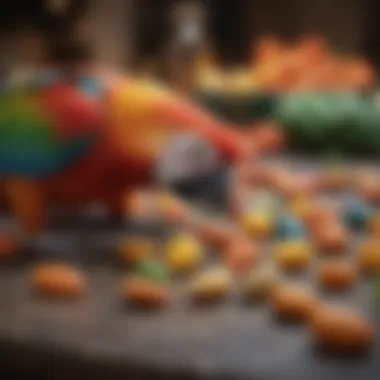
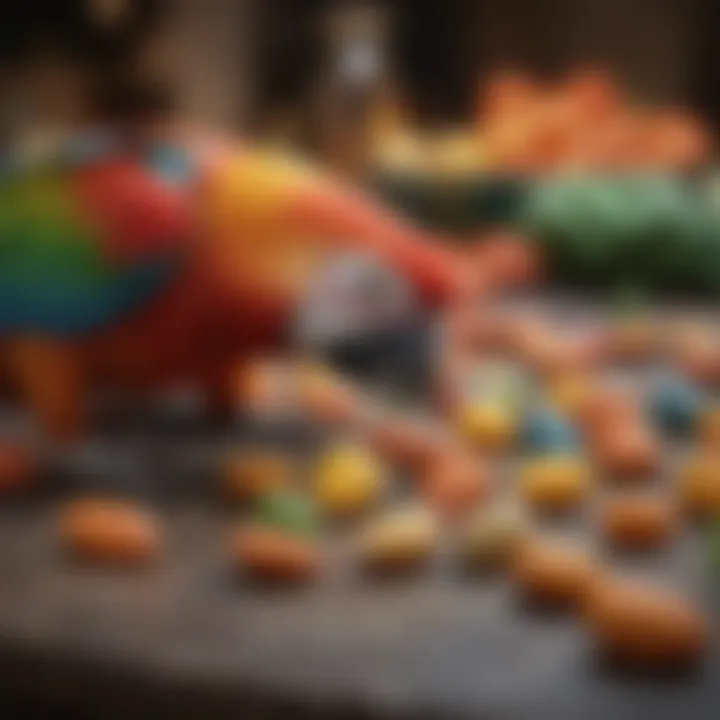
Intro
Parrots are remarkable creatures, known for their vibrant colors and unique personalities. However, as any experienced pet owner understands, a parrot's well-being heavily relies on its diet. This guide seeks to provide an all-encompassing look into the intricacies of parrot nutrition, highlighting the importance of a balanced diet tailored to their specific needs. So, whether you're a first-time bird owner or an experienced avian caregiver, understanding what fuels your feathered friend can make all the difference.
Understanding Your Pet
Caring for a parrot involves more than just providing a cage and some seeds. Understanding your pet’s behavior, breed characteristics, and dietary requirements is essential in ensuring their vitality and happiness.
Pet Behavior Basics
Parrots are intelligent and social birds. Their behavior is largely shaped by their environment and social interactions. Unlike a dog, a parrot won't just wag its tail to show affection or excitement. They express their feelings through vocalizations, body language, and engaging in playful antics. Understanding these signals is key to building a strong bond with your parrot.
Common Breed Characteristics
Different parrot species exhibit distinct characteristics. For instance, the African Grey is known for its intelligence and ability to mimic speech, while the Macaw stands out due to its large size and striking plumage. Recognizing these traits helps you adapt your care and feeding routines to better suit their specific needs.
Species-Specific Needs
Every parrot species has its own dietary requirements. For example, Budgerigars thrive on a seed-based diet, while larger parrots, like Cockatoos, require a more diverse array of fruits, vegetables, and nuts. This knowledge is crucial for crafting a suitable meal plan for your avian companion.
Pet Care and Maintenance
Proper care and maintenance extend beyond just what is served in the food dish. To ensure your parrot lives a healthy and fulfilling life, there are several essential practices to consider.
Feeding Guidelines
Feeding your parrot should encompass a range of items to ensure balanced nutrition. A good mix includes seeds, pellets, nuts, fruits, and vegetables. Here are some recommended foods:
- Pelleted diets: Specifically formulated for nutritional balance.
- Seeds: Best used as treats.
- Fruits: Such as mango and apple, for natural sugars.
- Vegetables: Leafy greens like kale or spinach for vitamins.
An ideal diet for parrots consists of approximately 70% pellets, 20% fresh fruits and vegetables, and 10% seeds.
Grooming Essentials
While parrots don't require frequent grooming like some pets, they benefit from regular activities to keep their feathers and beaks in shape. Nail trimming is also crucial to prevent injury. Bathing should not be overlooked; many parrots enjoy a light misting or gentle soaks in shallow water. Every so often, you could even use a bird-specific shampoo.
Hygiene Practices
Maintaining a clean environment is vital for your parrot's health. Regularly change the bedding in the cage and clean food and water dishes to prevent bacterial growth. Not just a chore, this practice keeps your parrot comfortable and minimizes the risk of disease.
Training and Development
Training is not merely about commands; it fosters a healthy relationship between you and your parrot, allowing better communication and trust.
Basic Commands and Skills
Start with simple commands such as "step up" or "come here." Using repetition and positive reinforcement, like treats or praise, can reinforce desired behaviors. Beyond commands, teaching your parrot tricks can stimulate their intelligence and keep them engaged.
Behavioral Training Techniques
Behavioral issues can arise without the proper direction. Techniques such as distraction, environmental modification, or teaching alternative behaviors can often mitigate undesired actions, like excessive squawking or biting.
Addressing Common Behavior Issues
Understanding what triggers issues is crucial. For instance, boredom can be a common cause of destructive behavior. Ensuring your parrot has plenty of toys and interactive activities is essential for mental stimulation.
Health and Wellness
A parrot's health is multi-faceted, encompassing physical check-ups to recognizing signs of illness.
Routine Vet Check-ups
Regular visits to an avian vet are important as they can spot potential health issues before they become serious. These check-ups should be routine, especially for older parrots.
Vaccination Needs
Just like other pets, certain vaccinations may be necessary for your parrot. Consult your vet about recommended vaccines, as these can help prevent various diseases.
Recognizing Signs of Illness
Being aware of abnormal behaviors or physical changes is crucial. Look out for changes in eating habits, feather quality, or activity levels. Early detection can save a life.
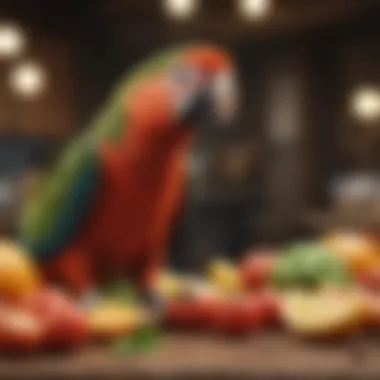
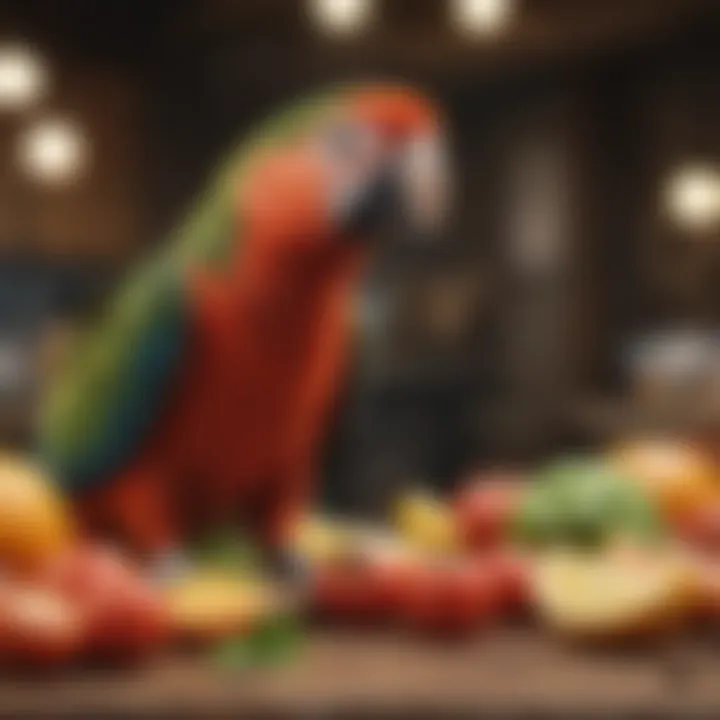
Enrichment and Activities
Enhancing a parrot's environment keeps them mentally engaged and physically active, contributing to their overall well-being.
Indoor vs. Outdoor Activities
While many parrots thrive indoors, they can benefit from safe outdoor experiences. Supervised time in a secure area exposes them to new stimuli. On gloomy days, however, ensure they have a variety of indoor activities and perch to keep boredom at bay.
Interactive Toys and Games
Interactive toys can boost a parrot’s problem-solving skills. Toys that dispense treats or require manipulation can keep them occupied for hours, preventing destructive behavior.
Socialization Opportunities
Parrots are social animals and thrive on interaction, both with humans and possibly other birds. Consider setting aside time each day for one-on-one bonding activities to enhance your parrot's social skills.
By exploring these dimensions of parrot care, you're not just feeding them — you're enriching their lives. Nurturing your knowledge about what every bird requires can pave the way for healthier, happier feathered companions.
Preface to Parrot Nutrition
Understanding what goes into a parrot's diet is of utmost importance for anyone who owns or cares for these vibrant creatures. Parrots are not just visually stunning; they are complex beings with specific nutritional requirements. A well-balanced diet is not merely a suggestion; it’s a cornerstone for their health and longevity. Why does parrot nutrition matter? Essentially, the right food nurtures their physical body and supports their avian intelligence, ensuring they remain active, playful, and lively.
Understanding Parrots' Dietary Needs
Parrots are often seen as picky eaters, and there is a reason behind that perception. In the wild, their diets consist of a variety of foods, including seeds, fruits, nuts, and even flowers. As pet owners, it’s crucial to channel that instinct when arranging meals. Each species of parrot has its own specific needs. For instance, a cockatoo may require different nutrients compared to a macaw or an African grey.
Specifically, they need:
- Vitamins: A blend of vitamins such as A, D, and E is essential for their immune health and overall metabolism.
- Minerals: Calcium and phosphorus are particularly important for strong bones and the development of healthy feathers.
- Fiber: This aids in digestion and helps keep their gut health in check.
Particular attention should also be paid to the proportions of these nutrients. Too much of one thing could lead to health problems, while too little can cause deficiencies. Getting this balance right can be a tightrope walk, but it's necessary for their well-being.
The Impact of Nutrition on Parrot Health
A parrot's diet influences more than just their appearance; it can have profound effects on their health and behavior too. Healthy feeding habits can lead to:
- Improved Lifespan: A well-nourished parrot can easily live several decades, far exceeding an unhealthy one.
- Boosted Immunity: The right nutrients bolster their immune system, helping them fend off diseases.
- Better Plumage: A nutritious diet supports feather growth and color vibrancy, adding to their visual charm.
- Reduced Behavioral Issues: Sometimes, a parrot's irritating behaviors stem from poor diet. What they consume plays a direct role in their mood.
"An ounce of prevention is worth a pound of cure." In terms of parrot nutrition, this could not ring truer. Establishing a suitable diet goes a long way in avoiding health scares.
In the following sections, we will delve deeper into the essential food groups for parrots, helping pet owners make informed choices that suit their feathered companions. From understanding the nutrient composition to exploring the balance of commercial and homemade diets, we aim to provide a detailed roadmap to optimal parrot health.
Essential Food Groups for Parrots
Understanding what goes into your parrot’s diet is paramount for their overall health and happiness. Different parrot species have different dietary needs, but there are essential food groups that provide the foundation for balanced nutrition. Focusing on these groups ensures that your feathered friend thrives, both physically and mentally. Providing a diverse range of foods not only keeps mealtimes interesting but promotes overall well-being.
Seeds and Grains
Seeds and grains form a significant part of many parrot diets, offering a blend of carbohydrates and fats that deliver essential energy. While seeds are often loved by parrots, it’s essential to recognize that not all seeds are created equal. Some seeds are high in fat, which can lead to obesity if given in excess. A mix of grains, such as oats, barley, and quinoa, can provide much-needed fiber and support digestion.
Consider offering seeds like hemp or safflower in moderation and balance them with low-fat grains. Too much reliance on fat-rich seeds can result in health issues. An ideal seed mixture should be supplemented with more nutritionally dense options, giving your bird a well-rounded diet.
Fruits and Vegetables
Fruits and vegetables are crucial for a parrot's dietary needs. They provide vitamins, minerals, and antioxidants that keep your bird as chipper as ever. Many parrots are partial to colorful fruits like apples, bananas, and berries, which not only taste good but also keep their immune systems robust.
In addition to fruits, leafy greens such as kale and spinach should not be overlooked. These veggies are low in calories and high in fiber, assisting with digestive health. Don’t forget to wash fruits and veggies thoroughly to remove any pesticides. Offering a rainbow of fruits and vegetables can entice a picky eater while supplying vital nutrients.
"A varied diet ensures that your parrot gets a wide range of nutrients, essential for vitality and longevity."
Pellets and Processed Foods
Pellets have been a topic of debate among bird owners. They are specially formulated to provide balanced nutrition, reducing the risk of dietary deficiencies that can occur with seed-based diets. However, not all pellets are created equal, so careful selection is necessary. Look for high-quality brands with no artificial colors or preservatives.
While pellets can serve as a staple food, they should not be the sole component. Combine them with fresh foods. Processing may compromise some nutrients, so diversify with fresh fruits and veggies for a complete diet.
Protein Sources
Protein is vital for the growth and repair of tissues but be cautious about its source. Parrots require protein for muscle maintenance and feather development. Natural sources like cooked eggs, legumes, or nuts in moderation are great options. Beans, like chickpeas and lentils, can be incredibly nutritious when cooked and offered in small portions.
However, keep an eye on nut portions as they are also high in fat. The balance between protein and fat needs to be watched closely to avoid health complications. Each species might have specific needs, so observing how your parrot responds to various protein sources is key.
Commercial vs. Homemade Diets
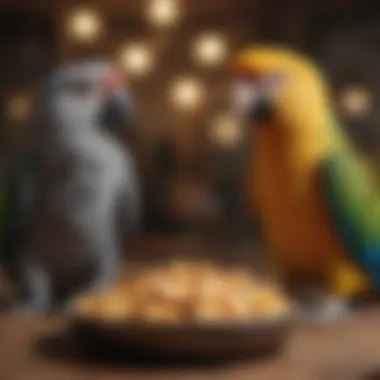
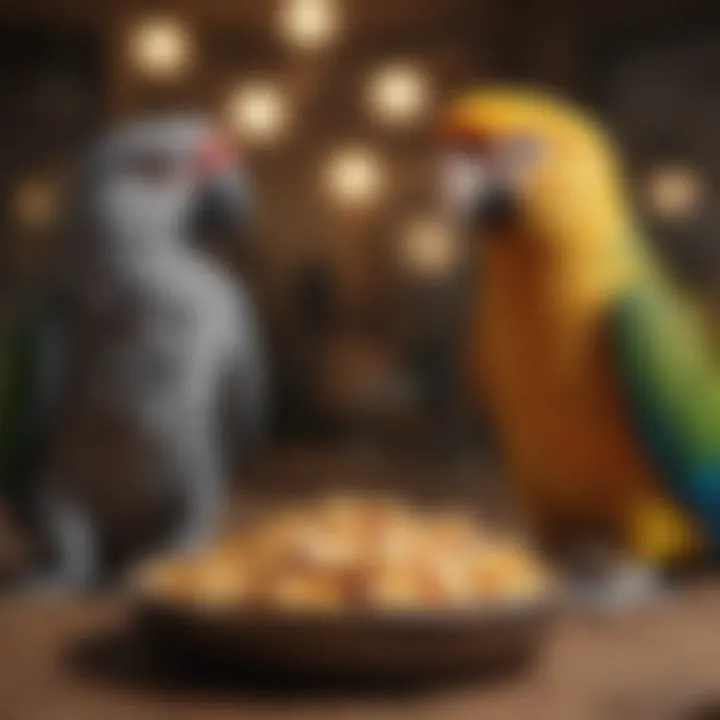
When it comes to deciding the best diets for parrots, the debate between commercial and homemade options is lively and often passionate. Understanding the differences, advantages, and pitfalls of each can empower parrot owners to make informed decisions that best suit their feathered friends. Opting for a well-rounded diet is paramount, as nutrition plays a significant role in health, behavior, and overall well-being. Here, we will dissect both approaches, considering their merits and nuances in depth.
Analyzing Commercial Parrot Foods
Commercial parrot foods often promise a balanced meal in a convenient package. Many pet owners appreciate the simplicity of pre-formulated diets. Most commercial products are designed to meet the comprehensive nutritional needs of birds, offering a blend of seeds, pellets, and sometimes added vitamins. Common brands such as Harrison's Bird Foods, Lafeber, or Kaytee provide varieties tailored to specific species of parrots, further enhancing their dietary appropriateness.
However, not all commercial diets are created equal. Many contain fillers, artificial preservatives, or low-quality ingredients. It is crucial to read labels closely. Look for high-quality grains, a variety of proteins, and fresh ingredients. A good starting point might be brands that emphasize whole foods and avoid artificial additives. While convenience is a big draw, remember that the quality of ingredients directly affects the health of your parrot.
Benefits of a Homemade Diet
Switching gears to homemade diets brings a different set of advantages. One of the most significant benefits is the control you have over ingredients. You can handpick the freshest fruits and vegetables while avoiding unnecessary preservatives. This freedom can help you create meals that are not only nutritious but also enticing and varied, keeping your parrot mentally stimulated.
- Tailored Nutrition: You can customize meals according to your parrot’s preferences or any allergies. If you know that your parrot loves a particular fruit or vegetable, you can incorporate that regularly.
- Cost-effective: Sometimes, preparing meals at home can be easier on the wallet, particularly if you buy in bulk.
- Freshness: You can ensure that your parrot is eating the freshest ingredients, which are crucial for their zest of life.
That said, homemade diets do require effort and knowledge. Parrots have specific dietary requirements, and it's vital to ensure that any homemade meals are balanced and fulfilling their nutritional needs.
Creating Balanced Meals at Home
Crafting a balanced meal for your parrot at home doesn't have to be a daunting task. Here are some vital points to remember:
- Diverse Ingredients: Incorporate a wide variety of fruits, vegetables, and grains. Think carrots, kale, apples, and quinoa. This ensures a broader spectrum of nutrients.
- Protein Inclusion: Include quality protein sources like cooked eggs, legumes, or small amounts of cooked chicken to provide necessary amino acids for growth and maintenance.
- Avoid Toxic Foods: Always avoid foods that are toxic to birds; for instance, avocados, chocolate, and certain seeds like apple seeds can be harmful.
- Consult Resources: Don't hesitate to reference reliable resources or consult with an avian vet to aid your meal preparations. Use reputable websites like Wikipedia or Britannica for research.
- Trial and Error: Don't be disheartened if your parrot is picky. Like a toddler, they may need time to warm up to new foods. Be patient and persistent.
One last tip? Consider your parrot's natural foraging behaviors. Mimicking the variety of textures and colors they would encounter in the wild can make feeding time an enriching experience.
"A parrot's diet does not just feed its body; it feeds its mind and soul. Variety is the spice of life, even in a bird's bowl."
Common Dietary Mistakes
Understanding common dietary mistakes is crucial for ensuring your parrot remains healthy and vibrant. Many caregivers, especially novices, might not realize the repercussions of their feeding habits. These errors can lead to nutritional deficiencies, behavioral issues, and even chronic health problems. Tidying up these common pitfalls can propel your parrot's quality of life and longevity. By recognizing and adjusting these mistakes, you'll forge a stronger bond with your feathered companion, while also boosting their wellbeing.
Over-reliance on Seeds
Seeds lay at the heart of many people's parrot diets. After all, it’s the first option that pops into minds when thinking about feeding these colorful creatures. However, if caregivers lean too heavily on seeds, it can be akin to living on fast food for weeks at a time. Seeds may be tasty, sure, but they often lack a variety of essential nutrients. Some bird owners might not realize that seeds, particularly sunflower seeds, are high in fat and can lead to obesity if overfed. In the wild, a parrot’s diet is diverse; it does not exist on seeds alone.
- Create a Balanced Diet: Consider incorporating other foods like fresh fruits, vegetables, and pellets into your parrot's meals.
- Seed Variety: If you choose to include seeds, opt for a mix that contains seeds with different nutritional values.
Being mindful of your parrot's diet will ensure they receive a more comprehensive range of nutrients. Nutritional balance can transform your parrot from a sedentary seed muncher to an energetic and playful avian companion.
Neglecting Fresh Foods
It's no secret that fresh fruits and veggies are like sunshine on a plate for parrots. Sadly, some caregivers sidestep these nutrient-rich foods, relying solely on processed or dry alternatives. When fresh produce gets ignored, parrots miss out on live enzymes, vitamins, and dietary fibers which simply can’t be replicated in pellets or seeds. Parrots are natural foragers, and the act of exploring different textures and tastes should be a delightful part of their feeding routine.
- Top Fresh Food Choices: Consider trying spinach, carrots, apples, and berries, which are usually well-received by many parrots.
- Rotate Options: Switch up the fresh offerings frequently to keep your parrot excited about their meals.
Incorporating fresh foods into your parrot's diet provides vital hydration in a way seeds cannot. Failing to include these choices could lead to boredom, paving the way for feeder refusal or worse yet, health issues that stem from a lack of variety.
Ignoring Water Quality
Water—an often forgotten, yet integral component of a parrot's diet. Caregivers may fill the water bowl with inconsistency, simply topping off stale water without consideration for its quality. Dirty or stale water can cause a host of health problems. Bacteria thrive in water that’s left sitting for too long, potentially leading to infections or digestive issues. It's essential to give your parrot fresh, clean water regularly to keep dehydration and illness at bay.
"Giving clean, fresh water is just as important as feeding the right foods. An overlooked, yet key, ingredient in your parrot's daily care."
- Daily Water Changes: Change your parrot's water every day to eliminate bacteria and ensure they have constant access to hydration.
- Use Glass or Stainless Steel Bowls: These materials do not harbor bacteria as much as plastic does and are easier to clean thoroughly.
In essence, prioritizing water quality is just as critical as attending to the solid food. Taking these actions contributes to a more thriving environment for your feathered friend.
The Role of Supplements
Supplements serve as an essential component in addressing the nutritional gaps that might be present in a parrot's diet. While many parrot owners focus primarily on the impression of variety through seeds, fruits, and vegetables, they might overlook critical nutrients that can bolster their bird's health. In certain situations, vitamins and minerals from supplements can be the difference between a thriving parrot and one that struggles with health issues.
Incorporating supplements into your parrot's diet should not be seen as a substitute for fresh and balanced foods but rather as an enhancement. There is a long-standing belief among avian veterinarians that a carefully considered use of dietary supplements can promote longevity and vitality in parrots. However, it is crucial to remember that not all supplements are universally beneficial; their use must be tailored specifically to individual birds based on their unique dietary needs and health circumstances.
"A well-rounded diet supplemented with the right nutrients can help support the immune system and overall health of your parrot."
When to Use Supplements
Determining when to use supplements can be a bit tricky. Several signs could indicate that your parrot might benefit from added nutrition:
- Dietary Deficiencies: If your parrot's diet consists primarily of seeds, there's a chance it's missing out on important vitamins and minerals. This could leave the bird vulnerable to deficiencies, such as Vitamin A or calcium.
- Age Factors: Younger birds or those that are breeding may have differing nutritional needs. Supplements can help meet their higher demand for specific nutrients.
- Health Issues: If your parrot has recently been ill or is recovering from surgery, your vet may recommend certain supplements to aid in recovery.
- Changes in Diet: Transitioning between diets or introducing new foods can be stressful. Temporary supplementation during these changes can help stabilize your bird’s health.
Types of Dietary Supplements
There are several types of dietary supplements available for parrots, and selecting the right one can greatly influence their health. Here are a few categories:
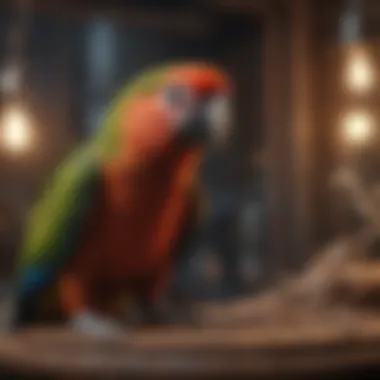

- Vitamins: These are crucial for maintaining various bodily functions. Common ones include Vitamin A, which supports vision and immune system function, and Vitamin D3 for calcium absorption.
- Minerals: Calcium and phosphorus are two prevalent minerals that play key roles in bone health and overall well-being.
- Amino Acids: These are the building blocks of protein and are especially important for feather health and repair. Supplements that contain essential amino acids can help a parrot's feather condition.
- Probiotics: These are useful in supporting digestive health, especially if your bird has experienced digestive issues.
- Fatty Acids: Omega fatty acids can be beneficial for skin and feather health and can also aid in reducing inflammation.
In selecting the right supplements, it’s wise to consult with an avian vet. They can guide not only which supplements may be necessary but also the correct dosage and frequency to help optimize your parrot's well-being.
Environmental Enrichment and Diet
When caring for parrots, one must not only think about the basics of nutrition but also how to make their diet engaging and fulfilling. This brings us to the concept of environmental enrichment in relation to their diet. Parrots are intelligent and curious creatures. Just tossing some seeds or pellets in their cage won't do. They need variety, and there's no denying that their environment plays a crucial role in their dietary satisfaction.
The key benefit here is stimulation. A varied diet can be a constant source of excitement for parrots. In the wild, they forage for food, encountering different textures and tastes. Recreating this experience in captivity is vital for their mental health. Moreover, introducing new foods can pique their interest in what’s available. An enriched environment encourages natural behaviors, ensuring your feathered friend remains both healthy and happy.
Importance of Variety in Diet
Having a diverse menu is not just a luxury but a necessity for parrots. A well-rounded diet provides the essential nutrients parrots need, preventing deficiencies that can lead to serious health issues. Different fruits, vegetables, grains, nuts, and seeds should all find a place in your parrot's bowl.
Moreover, birds can become bored with their food. This boredom might lead them to refuse meals, which is detrimental in the long run. For instance, pairing a favorite fruit like banana with less popular greens such as kale might coax them into trying new things.
It is worth noting that each parrot species has specific dietary needs. Some might thrive on more fruits, while others might require increased protein sources. Offering variety tailored to their species allows for a balanced diet. Failing to do so can lead to behavioral problems and nutritional deficiencies. Here are a few easy ways to introduce variety:
- Rotate fruits and vegetables seasonally.
- Share some cooked legumes, like lentils or chickpeas, for protein.
- Experiment with different seed mixes that aren’t overly fatty.
Interactive Feeding Methods
Enhancing meal times with interactive feeding methods can make a world of difference for your parrot. Rather than simply filling their bowl, consider incorporating activities.
For example, using puzzle feeders challenges their intellect and keeps them occupied. Hide treats within these feeders, and watch your parrot engage, problem-solving in real-time. This not only enriches their environment but also encourages foraging, which is crucial for their well-being.
Another method involves hanging food in different spots around the cage. This promotes exploration and helps them stay active. Just like humans, parrots appreciate a bit of variety in how their meals are served. Placement can even spark their natural instincts, ensuring they remain sharp and agile.
Using a combination of different fruits and nuts can be fun too. You could create a “foraging mat” using safe fabric and scatter their food across it. They would then scratch and peck at it, mimicking how they would search for food in the wild.
"An enriched diet isn’t just about what they eat — it’s about how they eat it."
Feeding Tips and Techniques
Feeding techniques are not just little tidbits of knowledge. They play a crucial role in ensuring that your parrot leads a healthy and fulfilling life. With the right style of feeding, you can foster a positive dynamic between you and your feathered companion. Plus, it’s another way to keep them stimulated and happy. Here, we will explore some distinct aspects that can help in fine-tuning your parrot's diet and overall experience.
Establishing a Feeding Schedule
Consistency is key in the realm of parrot care. Birds thrive when they have a routine, and establishing a feeding schedule can significantly shine a light on your pet’s eating habits. Start by feeding your parrot at the same time every day. This simple act can create a reassuring environment, allowing your bird to know when to expect food.
When setting a schedule, consider the natural rhythms of the bird. Notice when they seem most active and incorporate feeding times accordingly. Young birds may prefer multiple small meals throughout the day, whereas adults may benefit from structured sessions. Care should also be taken to remove any perishable food after a couple of hours to maintain freshness and hygiene.
Recognizing Food Preferences
Understanding what your parrot enjoys is half the battle. Just like humans, birds have tastes and preferences. It’s worthwhile to experiment with different types of foods, flavors, and textures. This isn’t just a chore; it's almost like a culinary adventure for your parrot! You might discover that they have a taste for sweet starfruit or prefer crunchy bell pepper strips over softer fruits.
Take note of these preferences, as they can help you create a more appealing diet that keeps your parrot interested in their food. Keep a journal—yes, a food diary for your parrot. Write down what they munch happily on and what remains untouched. It’s a great way to see trends and enhance their meals, ensuring they get all the nutrients while also enjoying their dining experience.
Handling Dietary Changes
Sometimes, you may face the challenge of introducing new foods or altering your parrot’s diet for various reasons. This can be tricky, as abrupt changes might create stress or anxiety for your feathered friend. The trick is to be gradual and patient. Instead of tossing new foods into the bowl, try mixing a small portion of the new items with the old. By blending things together, your parrot can get accustomed to the new flavors without feeling overwhelmed.
Here are some strategies for smooth transitions:
- Start Slowly: Introduce one new food at a time. It allows you to monitor your parrot's reaction and any potential issues.
- Observe Their Reactions: Pay attention to how they behave with the new food. Are they interested? Do they ignore it? This can guide you in further adjustments.
- Reinforce with Positivity: Offer praise or rewards whenever your parrot tries the new foods. This can encourage them to explore unfamiliar items.
Keep in mind, a balanced diet is not just important for health, it can also be an enriching experience for your parrot.
Fostering a variety of flavors and nutrients can make eating a delightful adventure rather than a mundane necessity. Adjusting the feeding techniques with consideration can greatly enhance the relationship and well-being of your avian companion.
Finale and Recommendations
In tying up the complexities of parrot nutrition, it’s crystal clear that a well-rounded diet is essential. A parrot's vitality, behavior, and lifespan are directly linked to the food it consumes. Recognizing the fine balance between commercial diets and homemade meals is crucial. While the former may offer convenience, the latter allows for more personalization and dietary adjustments based on the individual bird’s needs and preferences.
Summarizing Key Points
Before we start feeding our feathered friends, let’s touch base on some vital takeaways:
- Variety is crucial: Having a mix of seeds, pellets, fruits, and vegetables is not just a nice-to-have; it’s essential for holistic health.
- Supplement wisely: If your parrot is missing certain nutrients, supplements can help bridge the gap, but using them without professional guidance can lead to excess, which is just as harmful as deficiency.
- Watch out for common mistakes: Be aware of the pitfall of relying too much on seeds, as well as neglecting fresh foods and clean water, which can lead to serious health issues.
To sum it up, a parrot's dietary regimen is not just a checklist; it’s a dynamic part of their happiness and longevity. Each bird is different, so keep an eye on their individual reactions to various foods.
Encouraging Continued Education
The final piece of advice revolves around continuous learning. The world of avian care is ever-changing, and staying informed helps ensure our pets thrive. Reading reputable articles, engaging in communities, and keeping abreast of new findings about avian health can empower you as a caregiver.
Remember: Just because a food is safe doesn’t mean it’s ideal for every parrot. Research and adapt! Seek insights from resources like Wikipedia or forums on Reddit to gather diverse perspectives.
In summary, stay curious. Your parrot relies on you to make its world as enriching and healthful as possible. It’s a big responsibility, but one that brings immense joy and companionship. So, don’t hesitate to keep exploring, learning more, and adjusting your strategies for the benefit of your beloved feathered friend.







